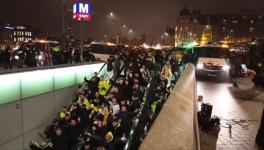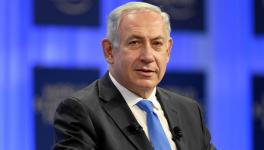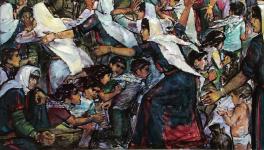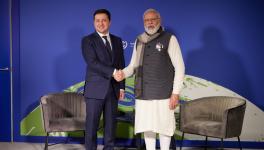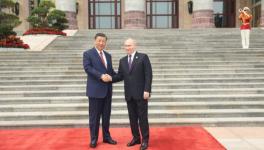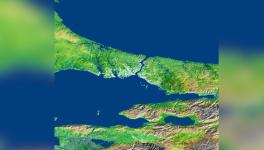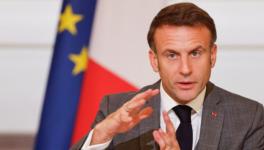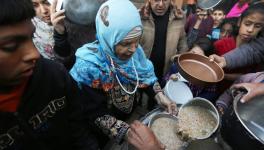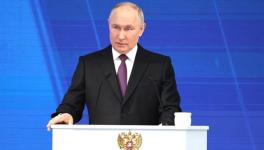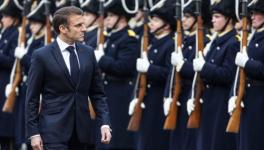NATO's Libyan War Crimes; ICC's Hypocrisy
Prof. Vijay Prashad, Trinity College, CT, USA speaks about the latest developments in the Libyan Civil War and NATO's actions. He also talks about the International Criminal Court's hypocrisy in not trying NATO for war crimes or for that matter, the US' drone attacks killing several civilians in Afghanistan and Pakistan.
Rough Transcript Prabir Purkayastha (PP): Hello and welcome to Newsclick. We have with us Prof. Vijay Prashad, Professor at Trinity College Connecticut. Vijay, good to have you back with us. NATO war on Libyan regime seems to be going on, doesn't seem to have produced anything concrete. Started with supposedly protecting civilians, at the moment it seems to be targeting television stations, basic infrastructure, Gadaffi's palaces where he stays. What is happening in Libya at the moment? Vijay Prashad (VP): Well, the US military commander that is the highest person in the military infrastructure Admiral Mike Mullen last week said that the Libyan conflict has entered a stalemate situation. I mean we have been talking about the stalemate for several weeks, but now he has said so himself. So I think we should start from the baseline. The military conflict is at the stalemate. The political situation is separate and we can get to that. They remains of course in the fighting hills in the Nafusa mountains where the people of the Kabil communities are fighting still but largely, the military question is in the stalemate. The middle of all these are of course the killing of the senior leader of the rebel forces and that has been followed by the bombing of the Libyan Broadcasting Authority. Fifteen people I think have been injured, three people have been killed and the reason the British has said they bombed the Broadcasting Authority was because they said they wanted to cut off Ghadaffi's to talk directly to the people they said that he is speaking incitement and incitement should be shut off. Others in Benghazi say the assassination of Abdul Fateh Yunus the head of the Libyan Rebel Command took place by a group that was communicated to from Tripoli via Libyan State Television that they may have been coded statements etc. So the whole thing has become very bizarre at the level of what people are saying. Certainly, there is a military stalemate, certainly there is a political dialogue that is happening and yet is happening in fixed and starts and finally this assassination of Abdul Fateh Yunus has most people on all sides deeply confused. PP: If you look at it, the whole arguments was that civilians had to be protected. NATO is clearly on the one side of the civil war. So the pretence of the protection of the civilians is gone. What we have is a civil war in which NATO is in on one side. Would that be a correct representation the military situation? VP: Well let's say this NATO conflict is going on in Libya since one hundred and twenty days. Perhaps, NATOs attempt to protect civilians lasted for forty eight years. It certainly didn't last for more than a few days because very soon after at least after 23rd of March, NATO had sent in airships to provide aerial support for the rebels as a advanced on Misrata. So it was clear within forty eight hours, fifty hours or so after UN resolution 1973 and after French first started bombing over Libya it is very clear that NATO has taken a position on behalf of the rebels and then very soon after that the language of the heads of the states of NATO countries that is to say United States, French and the British their language had made it clear when they said Gadaffi must go. There needs to be a major change in Libya. So former military position of supporting the rebels and for political support for rebels and finally, they corall the support of international criminal court Morano Campo who began to open the dossier to investigate the war crimes against Moammar Gadafi and of course Moran Campo has no point to open the dossier to investigate civilian killings to investigate by NATO aircraft. So it was a very one sided investigation by the International Criminal Court and therefore militarily, politically and in terms of international law it was clear that the G7 countries in NATO had come into a civil war on one side and was no longer following UN philosophy of responsibility to protect. PP: It is an interesting issue that you raised about the international court of justice because you look at the drone attack taking place in Afghanistan and Pakistan. We have had drone attacks which killed five children because they were working close to a suspected terrorist supposed to have been. So effectively, all these if you take in account what were international law is, these are all war crimes in any case which nobody seems to have be bothered about. VP: You know, last year Philip Austen who is the UN Special Rapporteur released a report on role attack and he suggested at a time that it was in his very guarded language it was more than likely that the utilisation of unmanned aerial vehicle is such as drones were a contravention of international law. In other words, drone attacks are illegal. Based on that, a group in England by the name of reprieve has submitted a criminal complaint against on the one side the drone operators who fired on one particular family in Northern Pakistan and against John Rezo, who is the general counsel of the CIA and admitted to the Newsweek magazine February that had signed off on drone attacks. So there is movement in the United Nations and cords in Britain to open prosecutions on drone attacks. There is utter silence in international criminal court on questions of drone attacks on direct attacks on civilians in Iraq, I mean there have been, people have come to international court based on wikileaks released on video tapes demonstrating a missile fired into civilian car and Mr. Moreno Campo has not taken that case, doesn't even open dossier. Even Moammar Gadaffi's daughter Ayesha Gadaffi submitted a complaint in the international criminal court about the killing of her children, her nieces and nephews by NATO bomb attack on Gadaffi's compound and as far as I know, no dossier has been opened on that either. People have been complaining that the international criminal court which is in an excellent idea has suborned to the logic of NATO. After all, the ICC provided NATO legal cover during the war of Kosovo when ICC opened dossier on various Yugoslavian and Serbian military commanders including of course Milosovich and commanders who have been recently turned over to ICC. Furthermore, the African Union why is the International Criminal Court emphasising prosecution on the continent of Africa and at the same time not opening any cases having to do with untied states in Iraq or Afghanistan. So this is a very broad and direct challenge to the ICC for what many people consider straightforward hypocrisy PP: Vijay, coming back to the political issue it is very clear, militarily there is now a stalemate which is difficult to break unless NATO is prepared to put large number of boots on the ground. Given this, do you see this sort of a de facto bifurcation of Libya for some foreseeable future or sort of settling down on that level or do you see something else likely to happen in the medium term. VP: Well, the major thing to point to is that the UN envoy has been shuttling between Tripoli and Bengazi that's Mr. Khatib who has a very good record in terms of his ability to talk to various sides. So one has to say that there is some hope that between African Union and the United Nations, they have been trying to open a political dialogue between Bengazi and Tripoli. That's the first thing to keep in mind. It's not that doors have been closed to some kind of diplomatic settlement. The second thing is it appears that Mr. Gaddafi told the UN envoy that he is willing at the present time to consider stepping down but he wants to live in Libya. Now, when this statement came out the British foreign ministry and the international criminal court said that this cannot take place because after all Mr. Moreno Campo has framed a warrant to the arrest of Mr. Gadaffi. So you know, they have taken off the table the potential of important building block for bringing the two sides together. So one has to go back to the international criminal court I think. I am hoping that the BRICS countries will take this up with Moreno Campo to actually back off from that warrant to enable inside Libya some kind of confidence building to take place between the two sides. There is an opening. If this opening is not allowed certainly, the partition of Libya is going to take place. That is a very sad situation. It proves to us that ariel bombardment of this kind. Intervention of civil wars is going to lead to the break up of states that have some viability and we see that in of course Yogoslavia and it is clear that it is exactly what has happened in Iraq. Iraq is putatively one country but really, effectively, it is at least two countries. The Kurdish region is entirely autonomous from the writ coming from Baghdad. So if the way forward is to bomb and break up countries, then this is the model. But I think there remains an alternative, there remains a different path and I think, it's first to articulate how the African Union and United Nations envoy are trying to work on that path. They have been given more credence by the international media and they have been given more space by the NATO command which has utterly discounted the work of the AU and the UN envoy. PP: Thank you Vijay, we will come back to you on this issue again. I think this Libya issue is not going to go away immediately. Thanks a lot. VP: Well, not for another hundred days.
Get the latest reports & analysis with people's perspective on Protests, movements & deep analytical videos, discussions of the current affairs in your Telegram app. Subscribe to NewsClick's Telegram channel & get Real-Time updates on stories, as they get published on our website.









